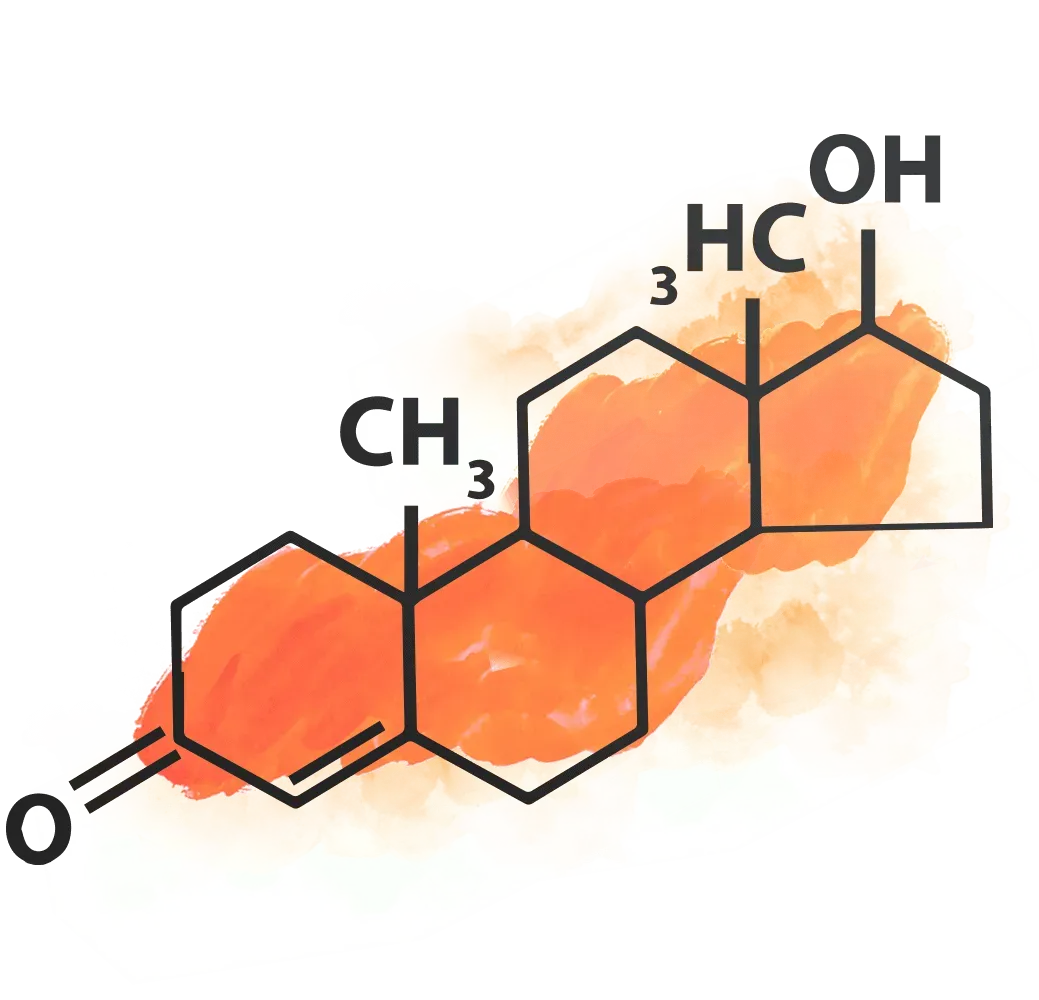TRT Cincinnati: Testosterone
Replacement Clinic
Optimize your health with TRT today!
CLICK BELOW TO WATCH FIRST!
TRT Cincinnati: Testosterone
Replacement Clinic
Optimize your health with TRT today!
CLICK BELOW TO WATCH FIRST!
TRT Cincinnati: Testosterone
Replacement Clinic
Optimize your health with TRT today!

Did You Know Low T Can Lead to...
Decreased sex drive
Reduced energy and motivation
Mood swings
And much more
Understanding the causes, low testosterone symptoms, and effects of low testosterone is crucial for developing effective treatment plans.
Andropause, commonly known as low testosterone or Low T, can drastically affect a man’s quality of life. Testosterone is an essential hormone, and when your levels drop, your health and well-being can suffer. Younger patients who desire future fertility should consider alternative treatments due to the risk of decreased sperm production.
Did You Know Low T Can Lead to...
Decreased sex drive
Reduced energy and motivation
Mood swings
And much more
Understanding the causes, low testosterone symptoms, and effects of low testosterone is crucial for developing effective treatment plans.
Andropause, commonly known as low testosterone or Low T, can drastically affect a man’s quality of life. Testosterone is an essential hormone, and when your levels drop, your health and well-being can suffer. Younger patients who desire future fertility should consider alternative treatments due to the risk of decreased sperm production.
Understanding Low Testosterone
Low testosterone, also known as hypogonadism, is a condition where the body produces insufficient amounts of testosterone, a hormone essential for male development and function. Testosterone levels typically peak in the late teens to early 20s and then decline by approximately 1% every year. This natural decline can lead to a range of symptoms, including fatigue, weight gain, decreased libido, and decreased muscle mass. Understanding the causes and effects of low testosterone is crucial for developing effective treatment plans.
Symptoms of low testosterone can be corrected by reestablishing and maintaining healthy testosterone levels through Testosterone Replacement Therapy (TRT). Testosterone cream allows for easy dose adjustments and flexible daily application. Testosterone pellets offer a convenient alternative, providing consistent testosterone delivery through a quick, minimally invasive procedure, with effects lasting around four to six months.
By restoring healthy testosterone levels, men can regain their vitality and improve their overall well-being.

Understanding Low Testosterone
Low testosterone, also known as hypogonadism, is a condition where the body produces insufficient amounts of testosterone, a hormone essential for male development and function. Testosterone levels typically peak in the late teens to early 20s and then decline by approximately 1% every year. This natural decline can lead to a range of symptoms, including fatigue, weight gain, decreased libido, and decreased muscle mass. Understanding the causes and effects of low testosterone is crucial for developing effective treatment plans.
Symptoms of low testosterone can be corrected by reestablishing and maintaining healthy testosterone levels through Testosterone Replacement Therapy (TRT). Testosterone cream allows for easy dose adjustments and flexible daily application. Testosterone pellets offer a convenient alternative, providing consistent testosterone delivery through a quick, minimally invasive procedure, with effects lasting around four to six months.
By restoring healthy testosterone levels, men can regain their vitality and improve their overall well-being.

The Importance of Testosterone
Testosterone is the primary male hormone responsible for androgenic properties, influencing confidence, drive, and determination in men. It plays a crucial role in various aspects of a man’s life, including relationships, career goals, athletic performance, socializing, and sex. Testosterone levels typically peak around age 25, and after that, production naturally declines, leading to reduced levels. Low testosterone levels can cause symptoms such as chronic fatigue, difficulty focusing, and reduced muscle mass. Symptoms of low testosterone can be corrected by reestablishing and maintaining healthy testosterone levels through Testosterone Replacement Therapy (TRT).
What is Testosterone and Why is it Essential to a Man’s Quality of Life?
Testosterone is a vital hormone produced by the testes in men, playing a crucial role in maintaining a man’s overall health and well-being. It is responsible for the development of male characteristics, such as facial hair, a deep voice, and muscle mass. Beyond these physical traits, testosterone significantly influences a man’s libido, energy levels, and bone density. As men age, their testosterone levels naturally decline, which can lead to a range of symptoms, including low libido, fatigue, and decreased muscle mass. Maintaining healthy testosterone levels is essential for a man’s quality of life, as it can impact his relationships, career, and overall sense of well-being.
The Importance of Testosterone
Testosterone is the primary male hormone responsible for androgenic properties, influencing confidence, drive, and determination in men. It plays a crucial role in various aspects of a man’s life, including relationships, career goals, athletic performance, socializing, and sex. Testosterone levels typically peak around age 25, and after that, production naturally declines, leading to reduced levels. Low testosterone levels can cause symptoms such as chronic fatigue, difficulty focusing, and reduced muscle mass. Symptoms of low testosterone can be corrected by reestablishing and maintaining healthy testosterone levels through Testosterone Replacement Therapy (TRT).
What is Testosterone and Why is it Essential to a Man’s Quality of Life?
Testosterone is a vital hormone produced by the testes in men, playing a crucial role in maintaining a man’s overall health and well-being. It is responsible for the development of male characteristics, such as facial hair, a deep voice, and muscle mass. Beyond these physical traits, testosterone significantly influences a man’s libido, energy levels, and bone density. As men age, their testosterone levels naturally decline, which can lead to a range of symptoms, including low libido, fatigue, and decreased muscle mass. Maintaining healthy testosterone levels is essential for a man’s quality of life, as it can impact his relationships, career, and overall sense of well-being.
Common Low Testosterone Symptoms:
Chronic fatigue
Loss of motivation
Increased body fat
Low libido
Brain fog
Mood swings
Erectile dysfunction
Muscle loss
If you’re experiencing any of these symptoms, it’s crucial to have your hormone levels checked. Optimize U is here to guide you through the process!
We offer customized testosterone replacement therapy (TRT) plans tailored to your unique needs, helping you feel and function your best. Hormone therapy, particularly for testosterone optimization, can alleviate these symptoms and enhance your overall well-being, from increased energy and improved intimate relationships to better health.

Common Low Testosterone Symptoms:
Chronic fatigue
Loss of motivation
Increased body fat
Low libido
Brain fog
Mood swings
Erectile dysfunction
Muscle loss
If you’re experiencing any of these symptoms, it’s crucial to have your hormone levels checked. Optimize U is here to guide you through the process!
We offer customized testosterone replacement therapy (TRT) plans tailored to your unique needs, helping you feel and function your best. Hormone therapy, particularly for testosterone optimization, can alleviate these symptoms and enhance your overall well-being, from increased energy and improved intimate relationships to better health.

Diagnosing Low Testosterone
Diagnosing low testosterone requires a comprehensive approach, including a physical examination, medical history, and laboratory tests. A healthcare provider will typically perform a physical examination to check for signs of low testosterone, such as decreased muscle mass and low libido. They will also review the patient’s medical history to identify any underlying conditions that may be contributing to low testosterone levels. Laboratory tests, including blood tests, will be conducted to measure the patient’s testosterone levels. A diagnosis of low testosterone is typically made when the patient’s testosterone levels are below 300 ng/dL.
Diagnosing Low Testosterone
Diagnosing low testosterone requires a comprehensive approach, including a physical examination, medical history, and laboratory tests. A healthcare provider will typically perform a physical examination to check for signs of low testosterone, such as decreased muscle mass and low libido. They will also review the patient’s medical history to identify any underlying conditions that may be contributing to low testosterone levels. Laboratory tests, including blood tests, will be conducted to measure the patient’s testosterone levels. A diagnosis of low testosterone is typically made when the patient’s testosterone levels are below 300 ng/dL.
How to Determine if You Have Low Testosterone
Determining if you have low testosterone requires a combination of self-assessment and medical evaluation. If you are experiencing symptoms such as low libido, fatigue, decreased muscle mass, or erectile dysfunction, it may be a sign of low testosterone. You can also take an online quiz or consult with a healthcare provider to determine if you may be at risk for low testosterone. A healthcare provider will perform a physical examination, review your medical history, and conduct laboratory tests to confirm a diagnosis of low testosterone.
How to Determine if You Have Low Testosterone
Determining if you have low testosterone requires a combination of self-assessment and medical evaluation. If you are experiencing symptoms such as low libido, fatigue, decreased muscle mass, or erectile dysfunction, it may be a sign of low testosterone. You can also take an online quiz or consult with a healthcare provider to determine if you may be at risk for low testosterone. A healthcare provider will perform a physical examination, review your medical history, and conduct laboratory tests to confirm a diagnosis of low testosterone.
The Impact of Low Testosterone on Quality of Life
Low testosterone can significantly impact a man’s quality of life, affecting not only his physical health but also his mental and emotional well-being. Decreased testosterone levels can lead to chronic fatigue, making it challenging to perform daily tasks and maintain a healthy work-life balance. Low testosterone can also affect relationships, as decreased libido and erectile dysfunction can strain intimate relationships. Furthermore, low testosterone has been linked to an increased risk of cardiovascular disease, osteoporosis, and cognitive impairment. Addressing low testosterone through hormone replacement therapy can help alleviate these symptoms and improve overall quality of life.
The Impact of Low Testosterone on Quality of Life
Low testosterone can significantly impact a man’s quality of life, affecting not only his physical health but also his mental and emotional well-being. Decreased testosterone levels can lead to chronic fatigue, making it challenging to perform daily tasks and maintain a healthy work-life balance. Low testosterone can also affect relationships, as decreased libido and erectile dysfunction can strain intimate relationships. Furthermore, low testosterone has been linked to an increased risk of cardiovascular disease, osteoporosis, and cognitive impairment. Addressing low testosterone through hormone replacement therapy can help alleviate these symptoms and improve overall quality of life.
Symptoms of Low T Levels
Low testosterone levels can manifest in various ways, significantly impacting a man’s quality of life. Common symptoms include:
Fatigue and lethargy: Persistent tiredness and a lack of energy can make daily activities feel overwhelming.
Decreased libido and sex drive: A noticeable drop in sexual desire and performance, often leading to erectile dysfunction.
Weight gain and increased body fat: Unexplained weight gain, particularly around the abdomen, and difficulty losing fat.
Loss of muscle mass and strength: Reduced muscle mass and strength, making physical activities more challenging.
Decreased bone density: Increased risk of fractures and osteoporosis due to weakened bones.
Mood changes: Symptoms such as depression, anxiety, and irritability can affect mental health.
Sleep disturbances and insomnia: Difficulty falling or staying asleep, leading to poor sleep quality.
Cognitive impairment: Trouble with concentration, memory, and mental clarity.
If you’re experiencing any of these symptoms, it’s essential to consult with a healthcare professional to determine if low testosterone levels are the underlying cause.
Symptoms of Low T Levels
Low testosterone levels can manifest in various ways, significantly impacting a man’s quality of life. Common symptoms include:
Fatigue and lethargy: Persistent tiredness and a lack of energy can make daily activities feel overwhelming.
Decreased libido and sex drive: A noticeable drop in sexual desire and performance, often leading to erectile dysfunction.
Weight gain and increased body fat: Unexplained weight gain, particularly around the abdomen, and difficulty losing fat.
Loss of muscle mass and strength: Reduced muscle mass and strength, making physical activities more challenging.
Decreased bone density: Increased risk of fractures and osteoporosis due to weakened bones.
Mood changes: Symptoms such as depression, anxiety, and irritability can affect mental health.
Sleep disturbances and insomnia: Difficulty falling or staying asleep, leading to poor sleep quality.
Cognitive impairment: Trouble with concentration, memory, and mental clarity.
If you’re experiencing any of these symptoms, it’s essential to consult with a healthcare professional to determine if low testosterone levels are the underlying cause.
Benefits of Optimize U Cincinnati Testosterone Replacement Therapy:
Enhanced energy and motivation
Support for fat loss and restful sleep
Boosted sex drive and confidence
Improved mood and muscle growth
By addressing the underlying hormonal imbalance, testosterone therapy can help men regain their confidence and improve their overall quality of life.
At Optimize U, we use only bioidentical, natural testosterone for optimal effectiveness and safety.
Best & Most Affordable TRT Clinic in Cincinnati!
With Over 3000+ 5 Star Reviews Nationwide
Benefits of Optimize U Cincinnati Testosterone Replacement Therapy:
Enhanced energy and motivation
Support for fat loss and restful sleep
Boosted sex drive and confidence
Improved mood and muscle growth
By addressing the underlying hormonal imbalance, testosterone therapy can help men regain their confidence and improve their overall quality of life.
At Optimize U, we use only bioidentical, natural testosterone for optimal effectiveness and safety.
Best & Most Affordable TRT Clinic in Cincinnati!
With Over 3000+ 5 Star Reviews Nationwide
Improved Sexual Health and Overall Well-being
Low testosterone levels can significantly impact a man’s sexual health, leading to erectile dysfunction and difficulty achieving an erection. Optimizing testosterone levels can create a solid foundation for healthy libido and erectile function. In fact, 95% of men with erectile dysfunction (ED) will not see improvement until low testosterone levels are corrected. Additionally, testosterone therapy can help with intimacy, energy, and sleep quality, leading to improved overall well-being.

Improved Sexual Health and Overall Well-being
Low testosterone levels can significantly impact a man’s sexual health, leading to erectile dysfunction and difficulty achieving an erection. Optimizing testosterone levels can create a solid foundation for healthy libido and erectile function. In fact, 95% of men with erectile dysfunction (ED) will not see improvement until low testosterone levels are corrected. Additionally, testosterone therapy can help with intimacy, energy, and sleep quality, leading to improved overall well-being.

Addressing Erectile Dysfunction with TRT
Erectile dysfunction (ED) is a common symptom of low testosterone, affecting up to 95% of men with hypogonadism. Testosterone replacement therapy (TRT) can help address ED by increasing testosterone levels, which can improve libido, erectile function, and overall sexual health. Bioidentical testosterone, in particular, has been shown to be effective in treating ED, as it is chemically identical to natural testosterone produced by the body. By addressing the underlying hormonal imbalance, TRT can help men regain their confidence and improve their overall quality of life.
Getting Started with Testosterone Therapy
Getting started with testosterone therapy requires a comprehensive approach, including a consultation with a healthcare provider, laboratory tests, and a personalized treatment plan. During the consultation, the healthcare provider will review your medical history, perform a physical examination, and discuss your treatment options. Laboratory tests, including blood tests, will be conducted to measure your hormone levels. Based on the test results, the healthcare provider will create a personalized treatment plan, which may include testosterone replacement therapy, bioidentical hormones, or other hormone replacement therapies.

How to Get Started with Hormone Therapy
To get started with hormone therapy, schedule a consultation with a healthcare provider who specializes in hormone replacement therapy. During the consultation, the healthcare provider will review your medical history, perform a physical examination, and discuss your treatment options. Laboratory tests, including blood tests, will be conducted to measure your hormone levels. Based on the test results, the healthcare provider will create a personalized treatment plan, which may include testosterone replacement therapy, bioidentical hormones, or other hormone replacement therapies.
Maintaining Optimal Testosterone Levels
Maintaining optimal levels is crucial for overall health and well-being. While testosterone replacement therapy can help alleviate symptoms of low testosterone, it is essential to maintain healthy lifestyle habits to support hormone production. A proper diet, regular exercise, and stress management can help support testosterone production and overall hormone balance. Additionally, regular monitoring of hormone levels and adjustments to treatment plans as needed can help ensure optimal testosterone levels are maintained. It is also important to consider the potential risks and benefits of TRT, including decreased sperm production, and to discuss these with a healthcare provider before starting treatment.

Addressing Erectile Dysfunction with TRT
Erectile dysfunction (ED) is a common symptom of low testosterone, affecting up to 95% of men with hypogonadism. Testosterone replacement therapy (TRT) can help address ED by increasing testosterone levels, which can improve libido, erectile function, and overall sexual health. Bioidentical testosterone, in particular, has been shown to be effective in treating ED, as it is chemically identical to natural testosterone produced by the body. By addressing the underlying hormonal imbalance, TRT can help men regain their confidence and improve their overall quality of life.
Getting Started with Testosterone Therapy
Getting started with testosterone therapy requires a comprehensive approach, including a consultation with a healthcare provider, laboratory tests, and a personalized treatment plan. During the consultation, the healthcare provider will review your medical history, perform a physical examination, and discuss your treatment options. Laboratory tests, including blood tests, will be conducted to measure your hormone levels. Based on the test results, the healthcare provider will create a personalized treatment plan, which may include testosterone replacement therapy, bioidentical hormones, or other hormone replacement therapies.

How to Get Started with Hormone Therapy
To get started with hormone therapy, schedule a consultation with a healthcare provider who specializes in hormone replacement therapy. During the consultation, the healthcare provider will review your medical history, perform a physical examination, and discuss your treatment options. Laboratory tests, including blood tests, will be conducted to measure your hormone levels. Based on the test results, the healthcare provider will create a personalized treatment plan, which may include testosterone replacement therapy, bioidentical hormones, or other hormone replacement therapies.
Maintaining Optimal Testosterone Levels
Maintaining optimal levels is crucial for overall health and well-being. While testosterone replacement therapy can help alleviate symptoms of low testosterone, it is essential to maintain healthy lifestyle habits to support hormone production. A proper diet, regular exercise, and stress management can help support testosterone production and overall hormone balance. Additionally, regular monitoring of hormone levels and adjustments to treatment plans as needed can help ensure optimal testosterone levels are maintained. It is also important to consider the potential risks and benefits of TRT, including decreased sperm production, and to discuss these with a healthcare provider before starting treatment.

Revitalize Your Life
Explore our extensive array of services designed to align with your unique goals and aspirations.
Revitalize Your Life
Explore our extensive array of services designed to align with your unique goals and aspirations.
Frequently Asked Questions
How much does it cost?
Optimize U designs hormone optimization plans for each individual patient. We have a full portfolio of products to suit the needs and goals of many different kinds of people. To that end, we work as a team to determine which products and services may best fit your goals and go from there. Our programs start as low as $165 per month and from there can increase based on which medications you and the provider deem are the bests fit for you.
What does the monthly fee include?
Our program provides hormone therapy that is designed to address specific issues with each person. We have a 3 Month minimum and a 30 Day cancellation policy. Our program includes:
All lab testing related to hormone optimization
All follow-up exams
All patient consultations
All physical examinations
A complete and personalized therapeutic program including all necessary drugs to maintain optimized hormone levels with the supplies needed
How much testosterone do I need?
Your team will carefully review your medical questionnaire, lab work, and records, and will prescribe the exact amount needed to optimize your levels. We use a combination of lab testing and continued monitoring of your results to identify the ideal dosages. Optimize U’s team uses creams, injections, or a combination of both.
Is testosterone optimization safe?
Yes. Many studies have shown that hormone therapy is safe when administered in the correct dosage and monitored by a qualified physician.
How long until I start to feel the result of hormone optimization
Some patients begin to feel the effects immediately. Most start to see benefits between 4-6 weeks, and about 25% take about 6 months to see benefits. What is important to remember is it took a long time for your body to get to this point and it may take a few months to get your hormones back to being optimized.
Being active, following our workout plan, and sticking to a healthy diet plan will expedite the benefits of hormone optimization.
What health issues are associated with testosterone deficiency?
Low testosterone in the male body can be the result of a disorder called Hypogonadism. Testosterone affects bone mass, fat distribution, and muscle development. In addition, testosterone helps to maintain energy levels, fertility, and sex drive.
Are there any side effects of testosterone replacement therapy?
As you consider whether or not testosterone therapy is right for you, there are side effects of testosterone replacement that you need to take into account. For example, if you already struggle with sleep apnea, testosterone therapy could potentially make your sleep apnea worse.
Another side effect could be decreased testicular size, and, in some cases, a decrease in sperm count. Fluid retention, liver toxicity, enlarged breast size, increased red blood cells, and acne are also potential side effects of testosterone replacement therapy. If you start to experience any negative side effects, report them to your local clinic immediately.
How do I refill my medication?
To make it easy and convenient for you, we have many ways to refill:
Use the “Refills” link found at the top of page
Text our 24-hour refill hotline
Call the clinic
Or just ask one of our staff next time you visit us
Remember that medications can take sometimes longer than a week to arrive at your home, so make sure to request refills when you have about 2 weeks of medication remaining.
How often is lab work done?
Lab work will be done every 3 to 6 months. Our staff will call you when your lab work is due. It is important to note that if you feel there is something not exactly right, you are always welcome to get your labs done early.
Frequently Asked Questions
How much does it cost?
Optimize U designs hormone optimization plans for each individual patient. We have a full portfolio of products to suit the needs and goals of many different kinds of people. To that end, we work as a team to determine which products and services may best fit your goals and go from there. Our programs start as low as $165 per month and from there can increase based on which medications you and the provider deem are the bests fit for you.
What does the monthly fee include?
Our program provides hormone therapy that is designed to address specific issues with each person. We have a 3 Month minimum and a 30 Day cancellation policy. Our program includes:
All lab testing related to hormone optimization
All follow-up exams
All patient consultations
All physical examinations
A complete and personalized therapeutic program including all necessary drugs to maintain optimized hormone levels with the supplies needed
How much testosterone do I need?
Your team will carefully review your medical questionnaire, lab work, and records, and will prescribe the exact amount needed to optimize your levels. We use a combination of lab testing and continued monitoring of your results to identify the ideal dosages. Optimize U’s team uses creams, injections, or a combination of both.
Is testosterone optimization safe?
Yes. Many studies have shown that hormone therapy is safe when administered in the correct dosage and monitored by a qualified physician.
How long until I start to feel the result of hormone optimization
Some patients begin to feel the effects immediately. Most start to see benefits between 4-6 weeks, and about 25% take about 6 months to see benefits. What is important to remember is it took a long time for your body to get to this point and it may take a few months to get your hormones back to being optimized.
Being active, following our workout plan, and sticking to a healthy diet plan will expedite the benefits of hormone optimization.
What health issues are associated with testosterone deficiency?
Low testosterone in the male body can be the result of a disorder called Hypogonadism. Testosterone affects bone mass, fat distribution, and muscle development. In addition, testosterone helps to maintain energy levels, fertility, and sex drive.
Are there any side effects of testosterone replacement therapy?
As you consider whether or not testosterone therapy is right for you, there are side effects of testosterone replacement that you need to take into account. For example, if you already struggle with sleep apnea, testosterone therapy could potentially make your sleep apnea worse.
Another side effect could be decreased testicular size, and, in some cases, a decrease in sperm count. Fluid retention, liver toxicity, enlarged breast size, increased red blood cells, and acne are also potential side effects of testosterone replacement therapy. If you start to experience any negative side effects, report them to your local clinic immediately.
How do I refill my medication?
To make it easy and convenient for you, we have many ways to refill:
Use the “Refills” link found at the top of page
Text our 24-hour refill hotline
Call the clinic
Or just ask one of our staff next time you visit us
Remember that medications can take sometimes longer than a week to arrive at your home, so make sure to request refills when you have about 2 weeks of medication remaining.
How often is lab work done?
Lab work will be done every 3 to 6 months. Our staff will call you when your lab work is due. It is important to note that if you feel there is something not exactly right, you are always welcome to get your labs done early.
Copyright © 2024 Optimize U Cincinnati - All Rights Reserved
Copyright © 2024 Optimize U Cincinnati - All Rights Reserved




